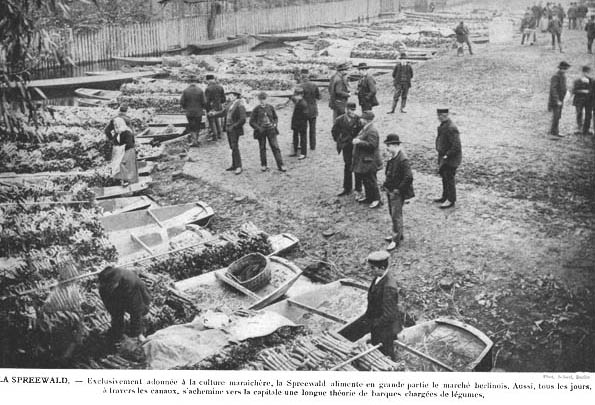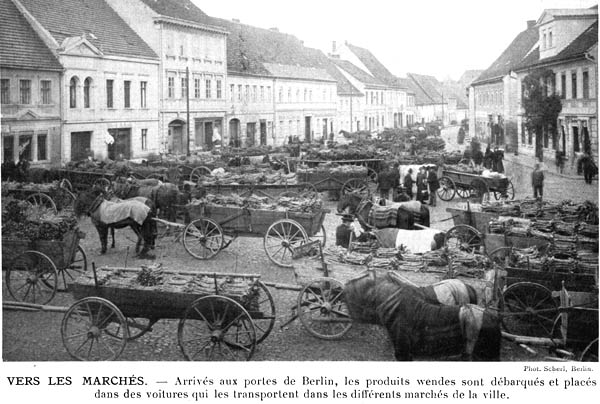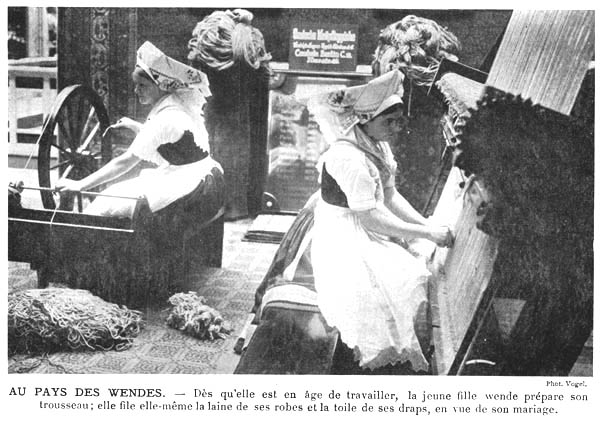![]()
the modern Germany in 1913
No. 003 - THE WENDES
AND THE SPREEWALD
from the travel notes of Jules Huret, journalist from the Figaro (1911/1913)
In Prussia, to 90km to the
southeast of Berlin, the Lusace is a region of the ex-East Germany today still
inhabited by a Slave minority the Sorabes (Sorben), also named Wendes at the
beginning of the century. Under Hitler's, no one wanted to pretend being Sorabe
nor... Slave. The main city is Lübbenau 16.000 inhabitants, situated close
to Cottbus. Sorabe people currently estimated at about 50 to 60.000 inhabs.,
has its own language, a radio, a theater at Bautzen and a chair of ' sorabisme'
at the Leipzig University. At the heart of Prussia in the Ier Reich era, the
Lusace is now situated near the Polish border. The old swampy forest has been
dried but it remains there a natural channel network that one visits in flat
boats conducts by boatmen who wish the welcome by " Wutrobnje Witajce ...herzlich
Willkommen ". The boat pilots company has been created in 1908.
This area of the ex-DDR was also the big region of open sky mining where took
out the lignite burnt in the big powerhouses of the EAST GERMANY implanted
in the region of Lübennau................. If you wish to visit this interesting
country, click here to go to the Tourist-Buro
of the Spreewald
The Wendes, a Slave tribe of the Marches of Brandenburg, were the fierce enemies of Germans. It is ten times, I believe, that they took, lost and took Berlin. Finally the Wendes, losers and reduced in slavery by the Teutonic knights, stayed during centuries aside from the conquering population which despised them. Today again, the German recognizes well the strong Wendish type, to his short head and square, to his redhead hair, chunky, to his rough speaking, who makes the background of the oriental population of Prussia. The Bavarian and inhabitants of the other provinces of the South claiming for them the pure Germanic blood, pretend, that East Prussia is not German, but Slave (the "Prussia" name comes in fact from "Borussia"). The name of Berlin (one pronounces Berline) has Slavic consonance, and not the Germanic consonance, as besides Ruppin, Plozin, Custrin, etc., all Prussian cities. From there a disdain that spreads to everything Prussian indeed. The Slavic language was spoken once upto Magdebourg, what serves to justify the historic pride of Poles and at once, the contempt of the "Alt Deutsch" for these illegitimate children of the East. However it seems that some remnants of the Wende race live on to the East of Berlin with its costumes, its traditions and even its language. The place is called the Spreewald, the forest of the Spree. It is, hardly at two hours from Berlin, a swampy plain where the Spree, get lost in some large ways and in a natural infinity of channels. One comes there from the capital, not so much to interest him to costumes and picturesque habits, than for picnics, to enjoy the beautiful forests of willows and beeches where the Wendes, previously, found a shelter against the Germans invasions.
 NOCTURNAL TRIP TO LÜBBENAU - It needs to two days to make the excursion.
While leaving from Berlin one Saturday after noon, one arrives toward four
O'clock and half to Lübbenau ( 90km to the southeast of Berlin, but we
are in 1910). There, a boat pick you and drives you, through the labyrinth
of channels, upto Burg, where it is necessary to attend on Sunday the procession
of the Spreewald women coming out of the mass.
NOCTURNAL TRIP TO LÜBBENAU - It needs to two days to make the excursion.
While leaving from Berlin one Saturday after noon, one arrives toward four
O'clock and half to Lübbenau ( 90km to the southeast of Berlin, but we
are in 1910). There, a boat pick you and drives you, through the labyrinth
of channels, upto Burg, where it is necessary to attend on Sunday the procession
of the Spreewald women coming out of the mass.
In this lacking of rural roads country, the long flat boat and the oar take
the place of diligence, bicycle or car. Women handle the two-prong iron-shod
perch with as much address and by force as men. Supplies are made by boat;
the postman has his rowboat, that it pushes himself, and in winter - water
being frozen - it shoes skates with long hooked tips, fit himself with a tall
iron-shod stick, to stride quickly over the frozen alleys .
We followed the classic program while embarking us on a long flat rowboat
of high mobile benches. The boatman standing to the rear, and we didn't see
him. The absolute silence, made the solitude strange and nearly worrying.
A suffocating heat burdened the saturated damp atmosphere, and soon large
drops of rain flattened on our benches. " It is the storm " said quietly the
boatman . And he gave us thick covers of wool, with which we enveloped us
under the tense umbrella. It was necessary to think of a retreat.
By a transverse way, the man drove us to the inn of the next village, a cottage
of wood where tourists were already installed. A dozen of plaisant maids distributed
with presence white beer and frothy milk. They were Wendes girls dressed in
the traditional costume: ample and very short skirt, black velvet blouse opened
on a low-necked shirt and without sleeves which let naked their thick red
arms; starched white muslin headdress. They went and came, quick and laughing,
what would be sufficient to betray their no Germanic origin. One feels them
rougher, less sensitive, more harsh. Their brutality is the one that I noticed
on the Prussians of the East,especially in Berlin, in all classes. Would the
Bavarian be right; and the present ruler of Germany would only be Slave?
 The storm continued. Travelers arrived, women with their underskirts folded
back on the head. Threecountrywomen, covered of dish-cloths and combed of
large black hats, embarked under beating rain. We decided to follow their
example to arrive to Burg not too late in the night. Soon after, rain stopped.
The storm continued. Travelers arrived, women with their underskirts folded
back on the head. Threecountrywomen, covered of dish-cloths and combed of
large black hats, embarked under beating rain. We decided to follow their
example to arrive to Burg not too late in the night. Soon after, rain stopped.
Fell the twilight. Added to the silence, the darkness recreated the charm
of the first hour. We entered in mysterious alleys of dull water edged of
black trees. It was the proud forest of the Spree (Spreewald). The straight
trunks rising in the sky seemed columns of a gigantic room. They sometimes
tightened themselves in a narrow passageway. ...... One can imagine: during
kilometers, the sky, constantly hidden up above by the enclosed ribs of willows
on the two banks, visible only through the sides of this gloomy nave; the
water more darker as the ceiling of leaves, and the silence........
....... Again we crossed a sleepy village; weak gleams sparkled from the tiny
windows of thatched cottages of which the most seemed died. The echo of men
voices reached us. They sang in chorus the Prussian national anthem.... We
arrived to Burg, - it was eleven O'clock. We spent a very bad night in an
awful inn.
THE SUNDAY TO BURG - The
following day, at dawn, we waited for the boat which had to drive us to the
church. We started under way immediately to arrive there before eight. What
a sweetness....... The green water has wrinkles of light; trees are reflected
in the water; while passing our boat troubles their reflection. Ghosts of
the night are bushes with slender trunks whose branches tilt; birds go on
from tree to tree, squawking, above of our heads; all is green, blue and golden.
One takes himself smiling to the nature as to a friend face. In the fields,
countrywomen in their ample sunday best skirts walked on very narrow trails
close to the streams, climbed bridges made of light boards placed on four
posts, that unite strands. Dresses of all colors were decorated of red, purple,
green, yellow velvet or of a color ribbon. A velvet bodice, an apron of silk,
the headdress with long antennas complete this sunday outfit. To the church,
the Mass is read in German and in Wende, men and women separated. Women in
bottom, tight on benches as red and white flowers, the united men in a mazzanine
all around the church. All sing during the office. Women have some frightfully
loud voices, that one cannot hear them without suffering. After the religious
service and when peasants dispersed through trails, pursued by the amateur
photographers, boats of tourists head toward the two or three occasional inns
on strands. In the orchards surrounding them, it is the ordinary spectacle
of the Berliner suburbs: families and groups get settled around small tables
with white and red tablecloths; of fat men in color shirts sleeves spoilsthem
with their hats decorated with small bunches of flowers. Thick fat forty or
fifty years old mothers distribute to eat to old grandmothers and children
nearly still to the bottle.
 The serving Wendes, yet quick, don't know how to answer to clamors; women
decide to help themselves and come back of the kitchen loaded of portions
of goose and pork roasts; men, with furious calls of starved ogres and eyes
out of the head, pursue girls, the fork and the knife to the hand, as if they
wanted to eat them, but are pleased to confirm their expected orders. Parties
of non-commissioned officers girthed in their blue tunics with new gold braids
that have just asked - what a lout tone ! - for fish, begin passionately to
eat strawberries they brought in paper. Girls in muslin dresses write post
cards at the corner of the tables. All happens in the most merely maners.
Sometook off one's shoes to be at ease, and walk in completely naked feet
in the grass; one hung to the trees of the orchard rucksacks, belts, jackets
and hats that embarrass. At the end the meal, a phonograph starts playing
military marches and waltzes, and all those that finished to eat sketch a
step of dance while humming.
The serving Wendes, yet quick, don't know how to answer to clamors; women
decide to help themselves and come back of the kitchen loaded of portions
of goose and pork roasts; men, with furious calls of starved ogres and eyes
out of the head, pursue girls, the fork and the knife to the hand, as if they
wanted to eat them, but are pleased to confirm their expected orders. Parties
of non-commissioned officers girthed in their blue tunics with new gold braids
that have just asked - what a lout tone ! - for fish, begin passionately to
eat strawberries they brought in paper. Girls in muslin dresses write post
cards at the corner of the tables. All happens in the most merely maners.
Sometook off one's shoes to be at ease, and walk in completely naked feet
in the grass; one hung to the trees of the orchard rucksacks, belts, jackets
and hats that embarrass. At the end the meal, a phonograph starts playing
military marches and waltzes, and all those that finished to eat sketch a
step of dance while humming.
Then one reembarks. The sky is ideally pure, a magnificent afternoon looks
promising. I light a cigar and I promise myself to be optimistic until the
end of the day. Here we are again lonely in the middle of the passing forest.
But soon - it is Sunday - we cross boats full of walkers coming from the of
vicinities. Some, probably struck by the majesty of the silence, are quiet;
others, coarser, sing some bacchic lieders. Other groups appear again. Here
are some tight couples, boys with ingenuously delighted look, the indolent
girls, the head leaning on their fiancé's shoulder. They hiss a tune from
the "master singers". Groups of friends put some double cherries on their
ears and greedily eat strawberries. Complete families, girls, youngsters in
navy blue suit, young people with shaven mustache, mothers of a certain age;
the red face after eating a good lunch, are crowned of plaited cornflowers
and white and yellow waterlilies. They make pain to see. Here is a boat where
are only girls in white toilet decorated of blue ribbons; they are eight all
the same, and the picture is charming; they smile gracefully while passing.
This vision harmonizes with the atmosphere of mystery, of poetry that surrounds
us................ (Sorry but this text was hard to translate, michel)
Contents of the Uhlan on the web
page updating the 9/09/2000